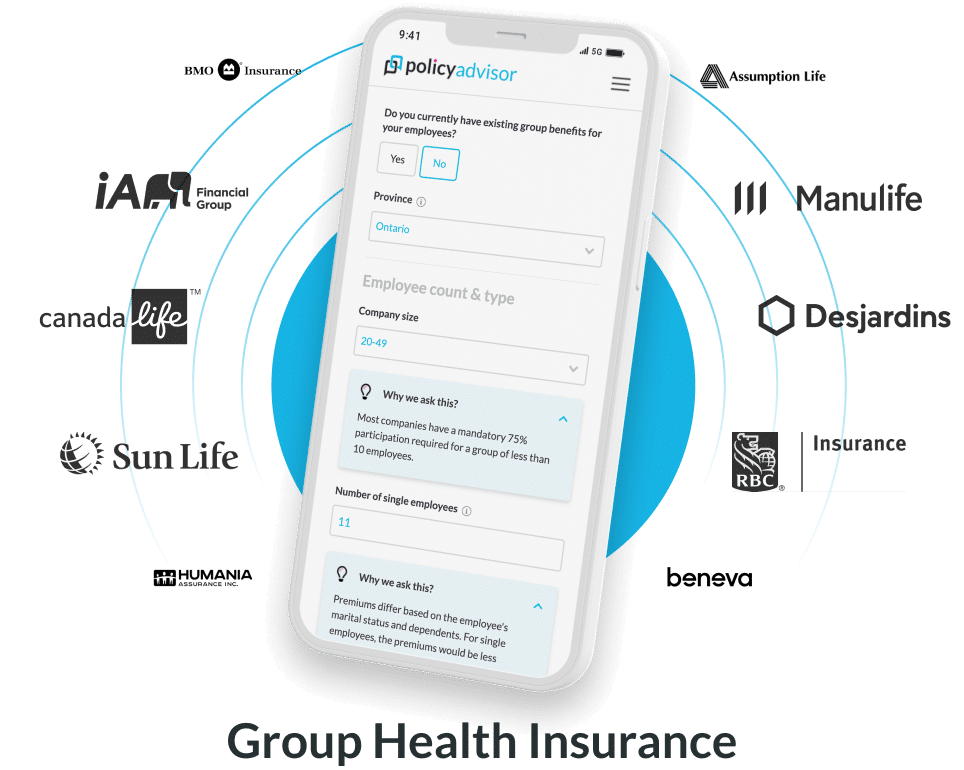- Mental health issues affect about 500,000 Canadians each week, leading to significant economic losses
- Employers can support mental health through benefits packages, including Employee and Family Assistance Programs (EFAP) and wellness benefits
- Employers can take proactive steps to create a healthier workplace environment, benefiting both employees and the company
In an ideal workplace today, mental health support is becoming increasingly important for employees. It’s a lifeline for moments when deadlines loom large and stress levels soar.
But what does mental health in employee benefits really include? It includes assistance programs, access to medical professionals, rehabilitation, disability support, etc.
In this article, we’ll give you an overview of how employee benefits cover mental health and why it is important.
The impact of poor mental health
According to the Canadian Mental Health Association (CMHA), every week, around 500,000 Canadians can’t work because of poor mental health and 38% have taken time off work in the last five years because of mental health issues like stress, anxiety, and depression.
It’s not just individuals who suffer; the Canadian economy loses billions every year, employers feel the pinch, and youngsters are often hit the hardest, with most feeling burned out. This is when offering mental health support as an employee benefit becomes more crucial than ever.
So, whether it’s providing support for remote workers feeling isolated or helping employees resume work, employers need to take action to create a healthier workplace for everyone.
Benefits of good mental health support
Mental health support in group benefits plans is essential for modern workplaces. By focusing on improving employee well-being and enhancing workplace productivity, these plans provide valuable resources that help manage mental health issues, leading to a healthier and more efficient workforce. Here’s how:
Improved employee well-being
- Access to professional support: Employees can utilize counselling services, therapy sessions, and wellness programs, helping them manage stress, anxiety, and other mental health challenges
- Reduced absenteeism: With better mental health support, employees are less likely to take time off due to mental health issues
- Increased job satisfaction: Feeling supported in their mental health needs can lead to higher job satisfaction and morale
- Better work-life balance: Access to mental health resources helps employees maintain a healthy work-life balance, which is crucial for long-term well-being
- Enhanced workplace culture: A supportive environment fosters a positive workplace culture, encouraging employees to be more engaged and motivated
Enhanced workplace productivity
- Improved focus and efficiency: Employees with good mental health can better concentrate and perform tasks efficiently, reducing errors and increasing productivity
- Reduced turnover rates: Offering mental health support demonstrates a commitment to employee well-being, leading to higher retention rates
- Better team dynamics: Mentally healthy employees contribute to a more harmonious and collaborative work environment
- Increased innovation: Employees who feel supported are more creative and willing to contribute new ideas
What can you, as an employee do to assess if you’re getting adequate mental health support at your workplace?
It’s alright to feel confused when you’re faced with endless pages of a policy that you don’t understand too well. However, you can always check if the mental health benefits offered at your workplace are sufficient for your needs.
Take a good look at your existing benefits to see what you have and don’t. Does your policy include therapy sessions? Are there any apps that help with stress management or offer well-being support? Do you have access to any pre-recorded therapy sessions that you can resort to if you don’t have a therapist on call?
If not, consider requesting your employer through the human resources department to offer you these benefits.
How much does it cost to include mental health in employee benefits?
According to the Canadian Psychological Association, the median coverage offered by Canadian employers for mental health support is around $750 annually. This sum usually covers approximately 3 to 5 therapy sessions.
However, if an employee is diagnosed with severe depression and/or anxiety, they would typically require between 8 and 20 sessions annually for adequate treatment and support. These additional sessions can cost employees anywhere between $2,000 and $4,000 annually.
For instance, Sarah, a marketing analyst at a mid-sized company in Toronto had been feeling increasingly anxious, struggling to work and maintain a healthy work-life balance. After consulting with a mental health professional, she was diagnosed with severe anxiety.
Her employer’s benefits package includes mental health support, offering a median coverage of $750 annually. However, as her treatment progressed, Sarah realized that she needs more sessions than her benefits offer.
Now, if Sarah opts for 8 therapy sessions annually, she would face an additional out-of-pocket expense of $450 per year. If she chooses 20 sessions annually, her out-of-pocket expense would increase to $2,250 per year. While Sarah’s employee benefits plan won’t eliminate these expenses, it will significantly reduce the financial burden on her.
How Canadian employers offer mental health support
So, what does mental health support look like in employee benefits packages? Here are some of the benefits that employers in Canada offer to their employees:
Why support mental health in the workplace?
Supporting mental health in the workplace is essential for several reasons:
- Enhances employee well-being
- Boosts productivity
- Reduces absenteeism
- Lowers mere presenteeism
- Increases employee engagement
- Improves employee retention
- Promotes a positive work culture
Want to choose the best group health plan with mental health benefits? Speak to our experts!
At PolicyAdvisor, our licensed experts will give you honest, unbiased advice that puts your needs first. So, if you’re looking for an insurer that will prioritize your employees’ mental health and give you a sustainable group health plan, speak to us today!
Frequently asked questions
How can employers identify mental health issues among employees?
Employers can identify mental health issues among employees by observing changes in behavior, such as shifts in mood or energy levels, monitoring performance for sudden declines, and conducting regular check-ins through one-on-one meetings. Utilizing anonymous employee surveys and encouraging open communication also help gauge mental health. Training managers to recognize signs of mental health issues and providing access to mental health resources further support early identification.
How do Employee and Family Assistance Programs (EFAP) support mental health?
Employee and Family Assistance Programs (EFAP) support mental health by offering confidential counselling services, resources, and support for employees and their families dealing with personal or work-related issues. These programs provide access to professional help and guidance, promoting overall well-being.
What role does paramedical coverage play in mental health benefits?
Paramedical coverage plays a crucial role in mental health benefits by covering the costs of services from mental health professionals such as psychologists, therapists, and counselors. This coverage helps alleviate financial barriers, making it easier for employees to access necessary mental health care.
What steps should be taken if an employee requests mental health support through the benefit plan?
If an employee requests mental health support through a benefits plan, handling the situation with care and sensitivity is crucial. Firstly, ensure the employee knows they have support available through employee assistance programs (EAPs) or mental health benefits provided by the company. Encourage open communication and offer accommodations if needed, such as flexible work arrangements or access to counselling services.
What are the most common workplace mental health issues?
In Canada, common workplace mental health issues include stress, anxiety, depression, burnout, and mood disorders. Employers play a vital role in identifying and addressing these concerns through proactive measures and supportive interventions.
Can I sue my employer for emotional distress in Canada?
In Canada, employees may be able to sue their employer for emotional distress in certain circumstances, such as cases of workplace harassment, discrimination, or negligence related to mental health support. However, the legal landscape surrounding emotional distress claims can be complex, and it’s advisable to seek legal advice to understand the options and requirements specific to each situation.
Mental health issues are widespread, impact millions of individuals, and cost the economy billions annually. Understanding if employee benefits cover mental health is crucial for both employers and employees in Canada. Employers are responsible for supporting employees’ mental well-being, as it can result in enhanced engagement and productivity within the workplace.


 1-888-601-9980
1-888-601-9980




